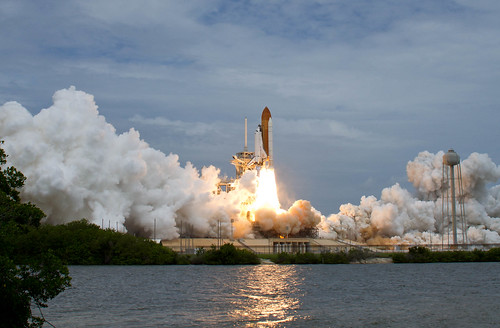Warning: This might turn into a long rant.
Last week marked two major events for America's space program: the last Space Shuttle launch and the recommendation by a House subcommittee that the James Webb Space Telescope be canceled. First, the shuttle...
I never got to see a shuttle launch or landing. I'm sad that I've lost my chance.
However, let's face it, the shuttles are an old, depleted fleet. They need to be retired. If you're feeling sad about the space shuttle program ending, it should be because there is no program to take its place. There is no replacement. Sure, there is movement towards private launch vehicles, but there isn't anything NOW. We won't be seeing any more pics like this one from Astronaut Ron Garan, currently on the ISS: 
We are now dependent upon Russian Soyuz spacecraft to get our astronauts to the ISS. (That whirring sound you hear is Kennedy spinning in his grave. Have we retroactively lost the Cold War?) This didn't need to happen. But funding for NASA is allotted by politicians who only see as far into the future as the next election cycle.
This brings me to the James Webb Space Telescope. This is an infrared observatory, often called the successor to Hubble, that is in line with what NASA used to call its "Great Observatories" (Hubble, Compton, Chandra, Spitzer - by the way, except for Compton, the others are still operating many years after launch). JWST is an ambitious mission, and yes, it is over-budget. But so was Hubble, and who would argue its value now? And do you know one of the reasons why JWST is over-budget? BECAUSE YOU CAN'T BUY THE COMPONENTS OFF THE SHELF!! This mission involved developing new technologies, not just building a telescope out of existing components. And that's what the best science experiments should do - push the boundaries of our capabilities, as well as our knowledge. Science requires a long-term investment, but now a group in the House is recommending the cancellation of JWST when it is already 75% complete. Yes, you read that right. As I wrote to my Representative, "Canceling this mission now is not a savings of money, but rather a great waste of money due to the completed equipment being idle on the ground."
But what else do you expect when knowledge is under attack in so many venues. Instead of funding education to the fullest, states all over the nation are making drastic cuts and undercutting their futures. Instead of trying to keep quality educators in the classrooms with fair compensation and benefits, the media devotes time to those bizarre few who retire with outrageous salaries. And how many stories have you read recently that college isn't for everyone, when the statistics show that college-educated folk were far less likely to have become unemployed during this recession? Is it any wonder that our desire for an instantaneous payoff now threatens our future, scientifically and economically? Look at this following graphic, representing NASA's astrophysics missions timeline: 
This is not a prudent restructuring of our fiscal responsibilities. This is the end of dreaming.
3 comments:
Someone gave me the argument that we shouldn't "waste" money on space exploration when there are so many hungry people down here on Earth.
My response was that yes, it is important to try to feed people's bodies, but to be fully human, we must also feed our hearts and souls, and *that* is why reaching for the stars literally as well as figuratively is important.
Thanks so much for this post. It's expressed a lot of my sadness and frustration, and opened my eyes to some other things.
My response to the "waste" comments is that the money spent doesn't disappear, it goes into people's checking accounts. Salaries, educational outreach, R&D funds, etc... are all a part of the budget.
Sadness and frustration, you nailed it!
Post a Comment